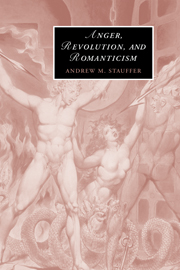Book contents
- Frontmatter
- Contents
- Acknowledgments
- List of abbreviations
- Introduction: fits of rage
- 1 Towards Romantic anger
- 2 Burke, Coleridge, and the rage for indignation
- 3 Inflammatory reactions
- 4 Provocation and the plot of anger
- 5 Shelley and the masks of anger
- 6 Byron's curse
- Epilogue
- Notes
- Bibliography
- Index
- CAMBRIDGE STUDIES IN ROMANTICISM
1 - Towards Romantic anger
Published online by Cambridge University Press: 22 September 2009
- Frontmatter
- Contents
- Acknowledgments
- List of abbreviations
- Introduction: fits of rage
- 1 Towards Romantic anger
- 2 Burke, Coleridge, and the rage for indignation
- 3 Inflammatory reactions
- 4 Provocation and the plot of anger
- 5 Shelley and the masks of anger
- 6 Byron's curse
- Epilogue
- Notes
- Bibliography
- Index
- CAMBRIDGE STUDIES IN ROMANTICISM
Summary
The French Revolutionaries did not invent anger, nor did English writers of the Romantic period develop their conceptions of that emotion in isolation from its literary and philosophical past. When Blake writes of “wrath” or Byron of “vengeance,” their language takes as a point of departure its pretexts, from the classical and Biblical periods through to their own. History may well have sculpted anger's articulation for the Romantics, but the clay itself was dug from the accumulated layers of thinking and writing in the Western tradition since Homer– with the eighteenth century and its particular attitudes uppermost. Thus, in order to understand the unique transformations that the events and exchanges of the period enjoined upon anger, we must first glance backward to gather the horizon of possibility within which these took place. Furthermore, if Romanticism is to be more than an historical descriptor roughly equivalent with the revolutionary spirit of the age, we have to attend to the aesthetic concerns that occupied writers even amidst, and sometimes athwart, their political interests and ends.
Romanticism is generally acknowledged to have emerged out of two parallel aesthetic movements or ideologies of the second half of the eighteenth century, both of which center on issues of emotional affect and transmission: sensibility and the sublime. Grief and terror were their foundational emotions, and in this chapter, I want to show how this meant that the Romantics inherited a tradition of thinking about (and writing in) anger that led to a seeming aesthetic paradox: how can a poet be filled with fury yet pleasingly terrified, enraged yet in control, angry yet a figure of sympathy to an audience? These dilemmas formed the unstable ground upon which the Romantics found themselves, newly pressurized by the discourse of the Revolution and the Terror.
- Type
- Chapter
- Information
- Anger, Revolution, and Romanticism , pp. 16 - 37Publisher: Cambridge University PressPrint publication year: 2005



